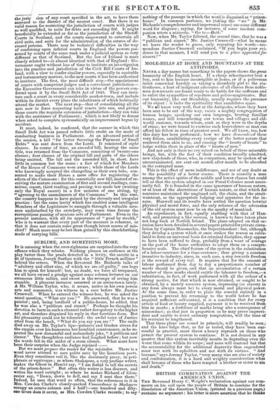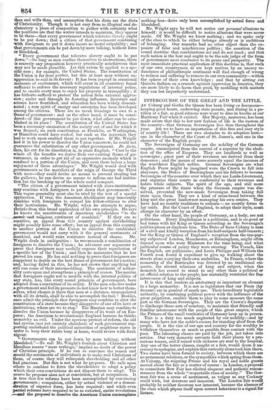BRITISH COMBINATION AGAINST THE AMERICAN UNION.
THE Reverend Henry C. Wright's reclamation against our com- ments on his call upon the people of Britain to combine for the dissolution of the American Union, (printed in a previous page,) contains no argument : his letter is mere assertion that he thinks thus and wills thus, and assumption that his dicta are the dicta of Christianity. Though it is not easy from so illogical and de- -amatory a piece of composition to gather with certainty what the positions are that the writer intends to maintain, they appear to be these—that every government which tolerates slavery ought to be put down ; that a citizen of that government combining 'With foreigners to put it down incurs no moral culpability; and 'that governments can be put down by mere talking, without force or bloodshed.
• "a Every government that tolerates slavery ought to be put down."—So long as men confine themselves to abstractions, there is scarcely- any proposition however practically mischievous that may not be made plausible. Let this axiom be applied to a spe- cific case ; for example, the United States. The constitution of the Union is far from perfect, but this at least may without ex- aggeration be said in its favour : It has been (except in occasional moments of excitement, which will occur in all countries) found sufficient to enforce the necessary regulations of internal police, and to enable every man to enjoy his property in tranquillity ; it has hitherto sufficed to protect the nation from external aggres- sion; under and through its fostering influence, literature and science have flourished, and education has been widely dissemi- nated; a rare spirit of energy and enterprise has been developed among the citizens. These are no mean blessings to owe to a frame of government : and on the other hand, it must be consi- dered—if this government be put down, what other can be esta- blished in its place ? The constitution of the United States has been a necessary emanation of the society out of and for which it was framed; no such constitution as Franklin, or Washington, or Hamilton could have wished, but such as the materials they had to work upon enabled them to put together. If Mr. Wright had it in his power to dissolve the Union tomorrow, he could not guarantee the substitution of any other government. De facto,
i
then, his cry for its dissolution is, n plain English, "Cast to the winds all the benefits we derive from our existing frame of go- vernment, in order to get rid of an oppressive anomaly which is confined to a portion of the Union, and even there leaves a large enjoyment of these advantages." Mr. Wright would deal with „governments as the moralists of the reign of George the Third with men—they could devise no means to prevent stealing but the gallows; he can devise no means to reform one bad institu- tion but the breaking up of the whole social compact.
"The citizen of a government tainted with slave-institutions .2111T combine with foreigners to put down that government."— This vague generality must also be tried by the test of a special • application. If true, the American Abolitionist may innocently .combine with foreigners to compel his fellow-citizens to alter their institutions. Mr. Wright, when he attempts to argue, slrinks from this broad application of his own principle. He says /le knows the sensitiveness of American slaveholders "to the -religiour...ntiment of mankind." If they are so sensitive, an appeal from this country against slaveholding " might possibly have some effect; but an appeal from this country
• to another portion of the Union to dissolve the established government would not carry with it the general sentiments of mankind, and would raise resistance instead of shame. Mr. -Wright deals in ambiguities : he recommends a combination of foreigners to dissolve the Union he advances one argument to prove that foreigners may usefully express their reprobation of • a specific law of the Union ; and then he maintains that he has proved his case. He has said nothing to prove that foreigners are competent to decide on the best frame of government for a nation; and, having failed in this, he has not shown that anything but evil can come of their intermeddling. The sentiment of nation- ality rests upon and strengthens a principle of reason. The maxim that foreigners ought not to meddle with the internal politics of any state, has, like every sound principle of government, been adopted from a conviction of its utility. If the men who live under a government and feel its pressure do not know how to better them- ...selves, what chance is there that men at a distance, unacquainted with all its details, shall be able to accomplish the task ? Besides, mace admit the principle that foreigners may combine to alter the :constitution of a state because they disapprove of one of its laws or institutions, where are we to stop ? The Russian may combine to dissolve the Union because he disapproves of its want of an Em- peror; the American to revolutionize England because he thinks • monarchy an evil. Under the specious pretext of reform, the old bad system (not yet entirely abolished) of each .government sup- porting underhand the political minorities of neighbour states in order to keep their rulers busy at home, would revive with fresh ..riigour.
. "Governments can be put down by mere talking, without
• adoodshed."—To call Mr. Wright's flourish about Christian and iiloodless means "mere verbiage," implied no doubt of the power of Christian principle. If he can so convince the reason and Ltaould thesentiments of individuals as to make real Christians of them, of course they will relinquish slaveholding and all other lad practices. But this is not what he proposes. He calls upon
• others to combine to force the slaveholders to adopt a policy which their own convictions .do not dispose them to adopt. The course he proposes aims not at conviction, but at compulsion. It is true that few reforms have been accomplished by convincing -governments ; compulsion, either by actual violence or a demon- latration of superior force, has been required : and while even :partial reforms lave required to be so extorted, entire revolutions rrnsad the proposal to dissolve the American Union contemplates
nothing less—have only been -accomplidhedly actual force and bloodshed.
Mr. Wright says he will not notice our personal allusions to himself: it would be difficult to notice allusions that were never made. Of Mr. Wright we know nothing ; and we spoke only of the class to which he either belongs already or is ambitious of belonging. Our remarks had no other object than the ex- posure of false and mischievous politics ; the assertion of the sound doctrine that combinations act and do not teach; and that each nation is the best and ought to be the sole judge of the form of government most conducive to its peace and prosperity. The most immediate practical application of this doctrine is, that such of our own countrymen as are kept restless by an uneasy re- dundance of philanthropic sentiment will find enough of wrong to redress and suffering to remove in our own community—within the sphere of their own knowledge ; and that by setting out Quixote fashion on a crusade against oppression in America, they are more likely to do harm than good, by meddling with matters they can but imperfectly understand.



























 Previous page
Previous page